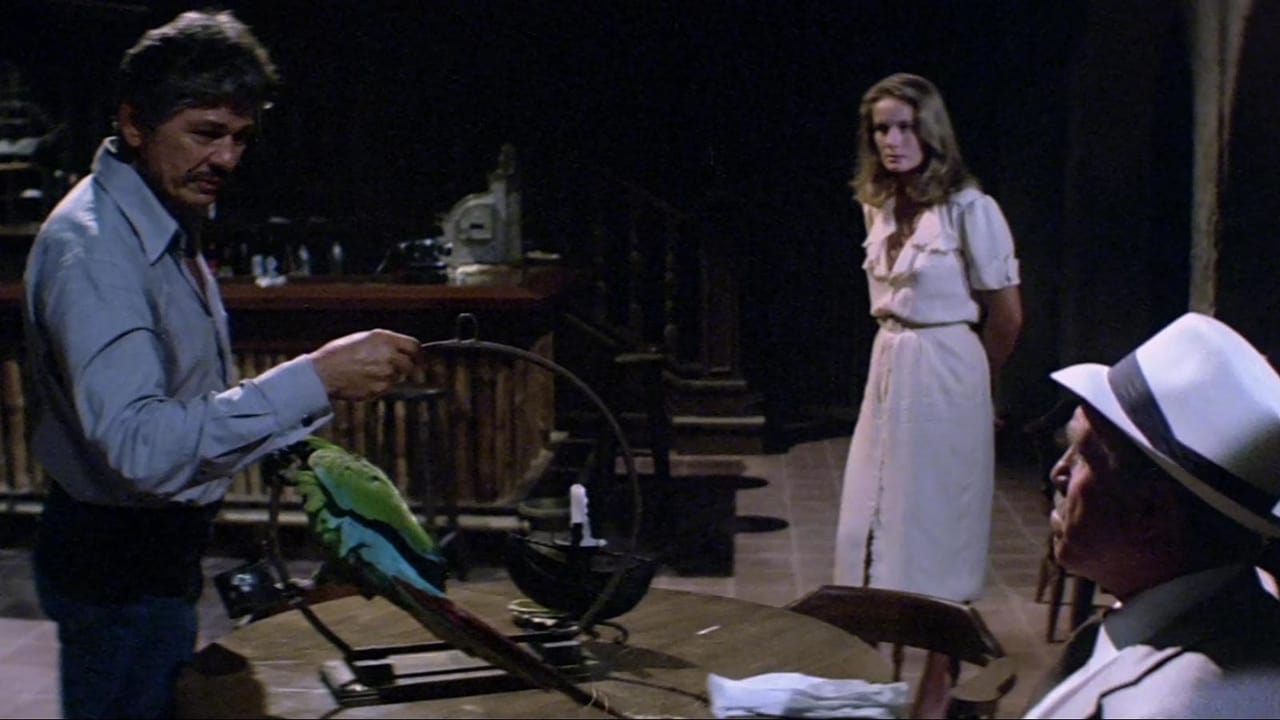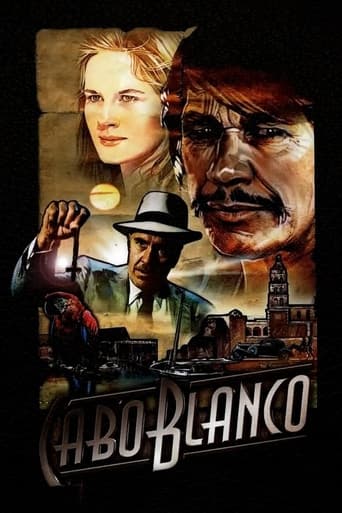BroadcastChic
Excellent, a Must See
Salubfoto
It's an amazing and heartbreaking story.
Teddie Blake
The movie turns out to be a little better than the average. Starting from a romantic formula often seen in the cinema, it ends in the most predictable (and somewhat bland) way.
Woodyanders
Laidback ex-patriot innkeeper Giff Hoyt (a nicely low-key performance by Charles Bronson) runs afoul of nefarious former Nazi Gunther Beckdorff (Jason Robards in fine crusty form) and falls for fetching French femme fatale Marie Claire Allesandri (a charming portrayal by the beauteous Dominique Sanda) while searching for sunken treasure in Peru in 1948.Director J. Lee Thompson, working from a convoluted and involving script by Mort Fine and Milton S. Gelman, relates the complex and compelling story at a steady pace, ably crafts a brooding film noir atmosphere, offers a flavorsome evocation of the exotic setting, stages the action scenes with skill and flair, and sprinkles in a satisfying smattering of pretty naked ladies for extra trashy good measure. The sturdy acting from the excellent cast helps a whole lot: Fernando Rey as suave, yet corrupt police chief Captain Terredo, Simon MacCorkindale as dashing sailor Lewis Clarkson, Camilla Sparv as washed-up booze-sodden floozy Hera, Gilbert Roland as alcoholic weakling Dr. Rudolfo Ramirez, James Booth as ill-fated diver John Baker, and Denny Miller as brutish flunky Hurst. Moreover, this movie deserves extra praise for being more plot and character driven than your average Bronson action opus. Jerry Goldsmith's zesty score hits the stirring and spirited spot. Alex Phillips Jr.'s sumptuous widescreen cinematography makes invigorating use of a constantly mobile camera. A worthwhile picture.
HEFILM
This is very slickly made film which sadly doesn't have a good reputation or a decent widescreen release. The camera-work on the film is excellent with much moving camera a great score and good locations.The odd thing is the bursts of full frontal nudity and one really graphic death scene. These seem to be included for fans of Bronson's gritty films but seem totally out of place here.Sondra is dull as usual. Bronson solid. Robards doesn't seem to want to be bothered by doing a German accent. It has real visual sweep. Odd rather forced voice over which seems to be trying to set this up for a sequel perhaps at the end.Despite these forced elements--of violence, nudity,and nostalgia--the bulk of the film works as a mystery and intrigue--rather than say action. One of the few of director Thompson's later films that really hearken back to his early Hollywood career of sweeping location quasi epics.Ending builds suspense only to pay it off in an offbeat--and perhaps off putting way for some.Deserves more respect and proper restoration than it gets especially among the later career of Bronson.
jaibo
The third collaboration between star Charles Bronson and veteran British director J Lee Thompson is, like its predecessor The White Buffalo, a strange beast but this time the collaboration doesn't quite manage produce something interesting. An all-star caper set in South America after the close of World War Two, Capo Blanco shows a disparate group of International adventurers going after what turns out to be a hoard of treasure looted by the Nazis during the war. The image of Capo Blanco as a melting pot of various International chancers gives the place in image as well as name a nod to Casablanca. The ex-patriot American protagonist, Giff (Bronson), runs a bar in town just like Rick in the classic and the supporting characters echo figures who once listened to the "You must remember this" refrain – an ultimately good but morally compromised police chief (Fernando Rey doing Claude Rains), a wicked Nazi (Jason Robards for Conrad Veidt) and a mysterious, beautiful woman with Paris in her past (Dominique Sanda standing for Ingrid Bergman). There is an awkwardness to the film, as if Thompson is unsure as to whether this is an homage or a pastiche.Thompson, in his later years especially, was a filmmaker whose world-view was riddled with misanthropy. Here he tries to take what Wilde might have termed a bank holiday from cynicism, as he confesses in a short "Making of" documentary filmed during the shoot, where he identifies the post-war setting as "…an era of romanticism, an age when things seemed to have a drive and excitement of their own, when values were considered to be important and the feeling that the hero in the end should triumph and that you could root for good against bad. We've lost a lot of that, as indeed we should do in the modern cinema. But that is occasionally something which should occasionally appear on the screens when we're making a film today." Cabo Blanco is an exercise in nostalgia but it is exercising muscles in Thompson which had long-since wasted away. For the most part Cabo Blanco a tired film. The story is told without any real effort at audience engagement. Most of the excellent cast are on auto-pilot. Yet this is the logical consequence of its nostalgic romanticism.The denouement, a long and not very well-paced scene in Giff's bar, sees the moral of the film being played out, yet it is as if the figures are animated waxworks re-enacting scenes from a no longer living past. The police chief, who has up until now assisted the Nazi in the search for the treasure, learns that it is loot from "Churches, synagogues, death camps" and so jumps ship, joining the good guys. He regains, in Giff's words, "his soul". The film dramatises a moment when the post-war allies had the moral high ground and where their rectitude could persuade others that they were indeed the good guys. This is a legend now, as the film self-consciously admits in a series of mythologising voice-overs, and Thompson can only repeat it, parrot it. The plot self-consciously involves a parrot's memory. It as if the myth were preserved in aspic, no longer a living thing. The epilogue, over which the voice over tells us that "the legend (…) grew and grew and Cabo Blanco prospered", shows Giff with a swanky house on a hill with the girl, living the good life. A good life built of the legend that he is a good guy.Yet Giff, as his back-story tells us, is a murderer. And as a murderer, he himself is on the run from gas chambers not in Nazi Germany but in the good old USA. Even when making a piece of supposedly romantic nostalgia, Thompson cannot help but let his cynicism seep out.
Fred Sliman (fs3)
Certainly one of the more eccentric of Bronson's starring vehicles, it tries to evoke memories of Casablanca even in its title. Taken apart from that unlikely-to-attain goal, it's fairly interesting, with a few talented cast members to keep it going (though they're not well served by the material). Large chunks of the story are pretty muddled, but as a curiosity piece, it's worth seeking out for Bronson completists.

